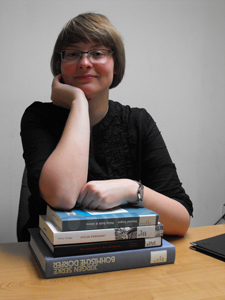In my Honors thesis, I analyzed the Jewish identity in selected works of the two contemporary German-Jewish authors, Barbara Honigmann and Gila Lustiger. As children of survivors, both writers push for a new Jewish identity, one that is not based on the victim identity created after the Holocaust in the Germanys in the 1950s and 60s and throughout the West. Honigmann and Lustiger challenge their primary audience, a German-speaking one, but also any audience, to redefine their conceptions of Jewish identity as their works present a variety of Jewish identities, for example based on Judaism, culture or even on political grounds. Both authors point out strongly that there is more to Jewish identity than the Holocaust which is only one identity among many, most prevelent among the survivor generation.
Generally, my research went right. The Interlibrary Loan Departement was essential to my research as it provided me with literature not available in the library. Some research, however, could not be obtained, which brought me to the Literaturarchive in Marbach, Germany, one of the most extensive library’s on German literature. I often met with my mentor, Dr. Jennifer Hoyer, who patiently answered my questions and guided me through this eighty-page endavor.
This research has let me to redefine my own conceptions of Jewishness since I had previously read literature by survivors who created a Jewish identity defined by the Holocaust. The works of Honigmann and Lustiger showed me that this second generation of writers deals with the effects of the Holocaust and are not accounts of survival, but rather what it is like to grow up as a child of a Holocaust survivor and how their own Jewish identity cannot be the one of the victim.
I really enjoyed writing this thesis and hope to use its research for future research in graduate school, which I will attend at the University of Arkansas.

